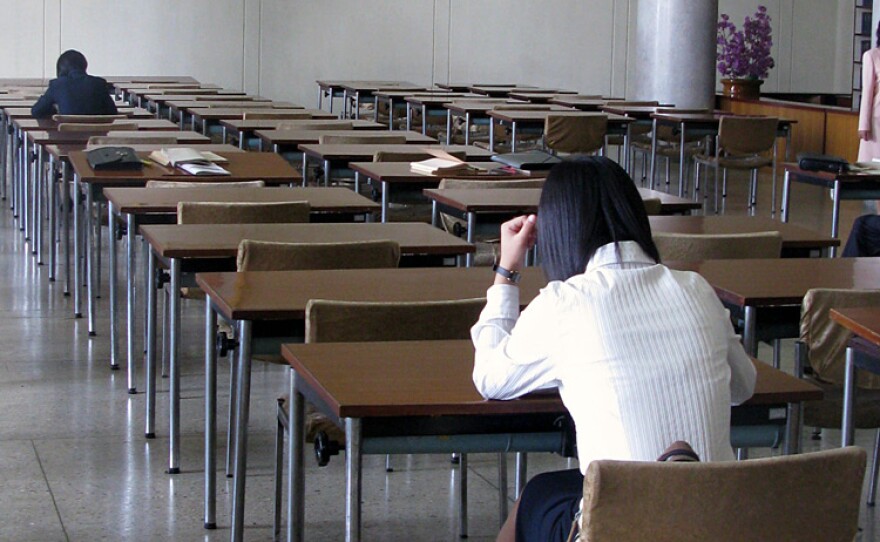NPR's Louisa Lim has just returned from a rare five-day visit to North Korea, where her movements were strictly controlled and monitored. She was not allowed to talk to locals, use the currency or leave the hotel unaccompanied.
Visiting North Korea is like stepping back in time. The capital, Pyongyang, feels as if the clock had been turned back half a century. There are few private cars on the roads, mostly ancient trams and electric buses. People actually walk from place to place. The city is very green, very clean, very orderly — and there is no pollution. After all, how can there be pollution when industry has pretty much ground to a halt?
While I was there, the moves of our tour group were severely restricted: We weren't allowed to talk to normal people, take photos out the windows of our bus, or venture out unaccompanied beyond the grounds of our hotel, which was conveniently located on its own island and earned the nickname "The Alcatraz of Fun."
Our guides, chosen for their ideological fervor and impressive language skills, were more like minders, primed to stop us from straying from the path and to deny even the most unassuming of demands, such as a visit to the No. 1 Department Store or a request to photograph someone in an army uniform.
Echoes Of Orwell
Towering over Pyongyang is the Ryugong Hotel, a hulking 1,000-foot-high pyramid under construction. Of course we weren't allowed to visit it. But we could see its peak finally being clad in metal panels — after a lack of funding caused a 16-year hiatus in construction. It's perhaps unfortunate that the building is pretty much identical in design to the Ministry of Truth in George Orwell's 1984, down to its 3,000 rooms.
And Orwell surely would have enjoyed monuments like the Tower of Immortality, built for "Eternal President" Kim Il Sung after his death.
No less bizarre is the fabled "on-spot guidance" given by the leaders. In the Grand People's Study Hall, which we were told cost $100 million to build, guide Kang Il Sung gave an example.
"Before the [library's] inauguration, all the desks were long and flat ones. The president, Kim Il Sung, told us it is not convenient for reading books, so he told the officials to make desks to be single, and more convenient," she said.
Other beneficiaries of this micromanagement are Pyongyang's iconic traffic ladies, an army of smartly dressed, baton-wielding beauties who are basically human traffic lights. They were recently said to be moved to tears after leader Kim Jong Il made sure they were provided with umbrellas, sunglasses, raincoats and cosmetics.

Land Of True Believers
Such is the daily news diet in North Korea. It's telling that although Kim disappeared from the international stage last year due to a suspected stroke, he was never absent from the North Korean media — or people's minds. Those we met were true believers, genuinely proud of their country, like artist Kim Sung Hee.
"Although our country is very small, no country can ever defeat or attack us. The reason is because we have a very great leader. Even the U.S. former leader Bill Clinton came here to see him. Our dear leader, Kim Jong Il, sits here in North Korea, but he can control politics everywhere in the world," she said.
During a performance at the Mangyongdae Children's Palace, a boy sang, "Kim Jong Il is our father." In North Korea, all art is still devoted to political ends. We saw room after room of children with practiced winsome smiles, and astonishing musical and acrobatic skills.
For me, the epitome of these child performers was the group of 70 kindergartners taking part in a scene called "The General and His Children" at the Arirang Mass Games, the months-long celebration of the birth of the country's founder, Kim Il Sung.
Some children, as young as 5 years old, not only ride unicycles, they jump rope on unicycles. That's just one breathtaking, shocking display of the control and indoctrination exercised in the name of the nation.
Cracks In The Facade
Pyongyang is certainly a showcase capital, with its parade of lavish monuments and picture-perfect performances, yet the countryside is anything but perfect. At one point driving to the demilitarized zone between North and South Korea, a broken bridge sent us on a 10-minute detour from a manicured highway, which had been conveniently curtained-off from the landscape by well-ordered trees.
Suddenly, we were plunged into a Brueghel painting: emaciated cows pulling handmade ploughs, women in headscarves wielding scythes. The scene — and the farming methods — seemed medieval.
There are fears of a poor harvest this year: Well-informed sources estimate a shortfall of 700,000 tons, in a country where one-third of the women and children are already malnourished.
But our minders repeatedly reassured us. "The harvest is very good this year," they said. And that perfect facade is all-important. It only dropped on a few occasions: the pinched, exhausted face of a bicyclist whose drab clothes ballooned around his skeletal frame, a sudden electricity blackout, a passing mention of John Grisham's novels, a chance sighting of a North Korean with a Rolex watch.
And then there was the karaoke.
At a small Pyongyang restaurant, the karaoke girls were word-perfect, singing none other than "My Heart Will Go On." Celine Dion is apparently big in North Korea, where Western cultural influences are deemed subversive.
What's more, the video had been recut with important political monuments. Pyongyang's Arch of Triumph flashed on the screen as the singers warbled, followed by the Tower of Juche Idea, a monument to self-sufficiency, one of the core principles of the Democratic People's Republic of Korea.
Maybe someone out there has a sneaky sense of humor; maybe the ideological controls are relaxing; or maybe, just maybe, Celine Dion is breaking down barriers.
Copyright 2022 NPR. To see more, visit https://www.npr.org. 9(MDAzMjM2NDYzMDEyMzc1Njk5NjAxNzY3OQ001))






